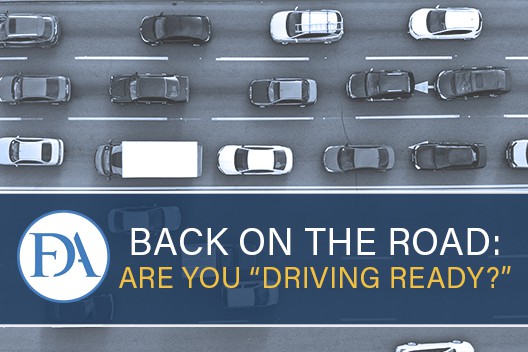At least some of the disruptions caused by the global pandemic are expected to ease soon, as state and local authorities begin to lift stay-at-home orders and allow a wider range of businesses to reopen. In Colorado, many of the restrictions that have shuttered “nonessential” operations in Denver and surrounding counties were modified as of May 8th, allowing more people to get back to work in some fashion.
For those of us who have been hunkered down with family and TV shows for nearly two months, the changes come as both a relief and a new challenge. Going back to work may be fraught with uncertainty, but there are practical steps you can take to make the transition less jarring. For example, taking stock of your current transportation situation is a must. Now that it’s time to actually leave the house on something more than a grocery run, are you “driving ready”?
Revving Up for the Commute
You might think a hiatus of only a few weeks would make little difference in how you navigate the outside world. But when those few weeks involve a shutdown on the scale that the United States has endured, a lot can change fast. Public transit systems, including the Regional Transportation District, have altered or canceled some services and may not gear up as quickly as riders expect; check with RTD before expecting to resume where you left off.
If you drive your own vehicle to work, take time for a little maintenance check, especially if the car has been idle most of the time. Batteries and tires may need the most attention, but don’t forget to check oil, gas, and other fluids as well. Many car washes have been closed for weeks, too; you don’t need to have your car showroom-ready, but make sure you have proper visibility, front and rear, before heading out.
Where is Everybody?
After weeks of nearly-deserted streets, some planners are expecting a sudden surge of traffic in coming weeks. It may be less than it was before because of layoffs and the number of people still working from home; then again, less use of mass transit and carpooling in an era of “social distancing” might prompt more people to drive themselves. In any event, don’t expect traffic to be as light as it was in April, and expect plenty of bicyclists to be on the road, too. Allow extra time to get to work — and be patient.
You should also be prepared for unexpected lane closures. Construction seems to have ramped up in some districts, even during the pandemic, and city officials have rerouted traffic in areas where they’ve been promoting bike and pedestrian use. If you haven’t traveled the route you usually take to work for several weeks, you may be in for some surprises. Fortunately, the City of Denver’s website allows you to access traffic cameras, current conditions, and real-time speeds to aid your planning.
The Key to Getting There from Here
We’re all in this together. That’s particularly true when we’re on the road. Nothing can eliminate the losses and anxieties we’re all experiencing during this pandemic. But some of the unknowns in getting back to work can be eliminated through careful planning. Give yourself plenty of time to reach your destination, be generous with other anxious drivers around you, and be sure to keep a mask, sanitizer, and cell phone handy for emergencies. By being driving ready, we can all make the ride a little easier.
The Car Accident Attorneys at FDAzar
For more than thirty years the attorneys at Franklin D. Azar & Associates have helped thousands of injured people obtain complete and timely compensation for their losses. Our proven track record and expertise have allowed us to grow into the largest personal-injury law firm in Colorado, with offices in Denver, Aurora, Thornton, Fort Collins, Greeley, Grand Junction, Colorado Springs, and Pueblo. If you’ve been injured in a bus, car, truck, or motorcycle accident, you may be entitled to compensation. Please call the car accident attorneys at FDAzar day or night at 720-372-2824 or contact us here for a free consultation and no-obligation evaluation of your case.



